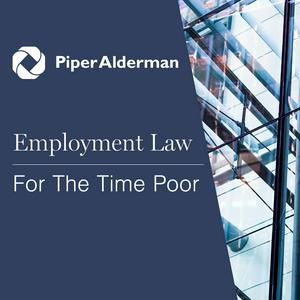47 episodes
#46 Employment Relations Podcast – Safety in the workplace: drug and alcohol testing and policies
14/01/2026 | 24 mins.January is a time where organisations often review their policies and procedures for best practice compliance. One policy that might need a review, following recent case law developments, is your organisation's drug and alcohol policy.
In this episode of Employment Law for the Time Poor, Emily Haar, Partner, and Maida Mujkic, Associate, consider the implications for organisations arising from a string of 2024 and 2025 decisions in the Fair Work Commission.
In these cases, the issue of whether a dismissal following a positive substance test was "unfair" turned on how testing policies were worded, whether the organisation tested for "impairment" or a mere positive result, and how the relevant policy was communicated to staff. Having a very clear policy that sets out the rules is important, but if no one in the organisation understands what is expected of them, or how the employer will deal with a positive result, the organisation is placed at significant risk.
The situation becomes even more complicated because prescription medications, including medicinal cannabis, can also create potential safety risks in the workplace. Taking the time to get your safety framework right, including regular reviews to address changes, will be time well spent.
The following cases are discussed in this episode:
Gauci v DP World Brisbane Pty Limited [2024] FWC 2351
Woodgate v Queensland Rail [2024] FWC 3165
Sydney Trains v Goodsell [2024] FWCFB 401
Mills v Glamorgan Spring Bay Council [2025] FWC 116
Sydney International Container Terminals Pty Ltd v Hancock [2025] FWCFB 106
DP World Sydney Limited v Witherden [2025] FWCFB 133
For more on these issues, including relating to consultation, see our earlier Insight here: https://piperalderman.com.au/insight/lessons-for-employers-how-failure-to-consult-on-workplace-policy-led-to-reinstatement-of-intoxicated-worker/- Authors: Emily Haar, Andrew Stewart
In this special live-recorded episode of Employment Law for the Time Poor, Professor Andrew Stewart, Consultant, and Emily Haar, Partner, close the national Australian Labour and Employment Relations Association (ALERA) conference on 11 October 2025 with a wide ranging discussion touching on the latest hot-topics in employment and industrial relations.
They delve into the details of the recent FWO v Woolworths and Coles "annualised salaries" decision (more on that here) and the significant implications for record-keeping obligations, consider the biggest "fizzers" and "sleeper issues" in the recent rounds of reform, gaze into the crystal ball as to what may be coming down the legislative pipeline, and even take questions from the floor.
A very sincere thank you to the organising committee from ALERA for the opportunity to take our project on the road to Brisbane and to be able to connect with the profession nationally.
Subscribe here to ensure you never miss an invite to one of Piper Alderman's Employment Relations events. #44 - Employment Relations Podcast: When is the deal done? Resolving employment disputes
30/06/2025 | 20 mins.Authors: Emily Haar, Ben Motro
Has this happened to your organisation? You're negotiating an exit with an employee, or perhaps you are working through a conciliation or mediation following the filing of an employment-related claim, and you think you have a resolution, though nothing has been signed yet. You might wonder, do we have a binding or enforceable settlement, even without anything signed?
In this episode of Employment Law for the Time Poor, Ben Motro and Emily Haar push past some of the legalese to work through when a settlement agreement is binding, how particular Court and Tribunal processes can impact the steps taken to "get to the deal", and what common "settlement" phrases mean and how they may impact the enforceability (or not) of a settlement proposal.
For more practical tips from our Employment Relations team, we are hosting several Workplace Training events throughout the year, including on managing common employee-claims. Subscribe here to ensure you never miss an invite to one of our events.
For additional insights into best-practice drafting of deeds of release more generally, see our on-demand training here, and our summary of the Elisha v Vision Australia decision here.#43 – Federal Election 2025: What is being proposed for industrial relations reform?
23/04/2025 | 32 mins.Authors: Emily Haar, Andrew Stewart
In this special election episode of Employment Law for the Time Poor, just in time for your second April-long weekend, Professor Andrew Stewart, Consultant, and Emily Haar, Partner, discuss the various policy announcements from the major (and minor) political parties, stakeholders' wish lists for reform, and other "things to watch out for" ahead of the Federal Election on 3 May 2025.
Following the election result becoming known, Piper Alderman will be hosting a national roadshow of in-person events where Professor Andrew Stewart will provide further insights about what to expect over the next Parliamentary term. Subscribe here to ensure you never miss an invite to one of our events.#42 – What could the proposed ban on "non-competes" mean for Australian employers?
31/03/2025 | 36 mins.Authors: Emily Haar, Andrew Stewart
As part of the recent Federal Budget, the Treasurer announced plans to ban "non-compete" clauses in employment contracts for employees earning below the high income threshold (currently $175,000 per annum) from 2027, to much media attention. But with the finer details to be the subject of further consultation (and a Federal election on 3 May 2025 in the meantime), what might be on the horizon in this space?
In this episode of Employment Law for the Time Poor, Professor Andrew Stewart, Consultant, and Emily Haar, Partner, discuss the difference between "non compete clauses" and other post-employment restraint clauses, the policy, productivity, and research bases for reform, what these reforms might look like in practice, as well as some "real life" considerations for businesses to best protect their interests now.
These discussions show that a one-size-fits-all approach to the protection of an employer's interests in its client and customer relationships, if it ever were enough, will not cut it going forward if labour mobility significantly increases. If businesses are less able to rely on contractual post-employment restraint clauses, alternative methods to otherwise protect confidential information and intellectual property, such as technology and a strong internal innovation culture, become ever more important.
More Business podcasts
Trending Business podcasts
About Employment Law for the Time Poor
A podcast from Piper Alderman's Employment Relations team where they discuss the important topics in employment law in Australia.
Podcast websiteListen to Employment Law for the Time Poor, The Prof G Pod with Scott Galloway and many other podcasts from around the world with the radio.net app

Get the free radio.net app
- Stations and podcasts to bookmark
- Stream via Wi-Fi or Bluetooth
- Supports Carplay & Android Auto
- Many other app features
Get the free radio.net app
- Stations and podcasts to bookmark
- Stream via Wi-Fi or Bluetooth
- Supports Carplay & Android Auto
- Many other app features


Employment Law for the Time Poor
Scan code,
download the app,
start listening.
download the app,
start listening.





























